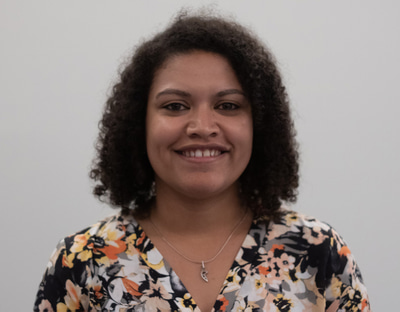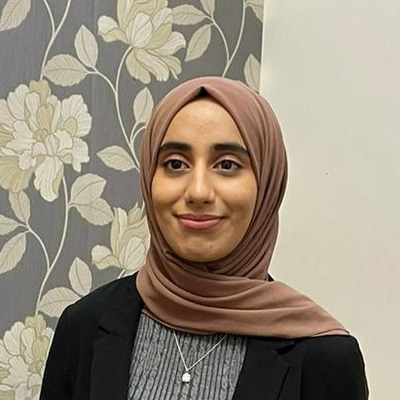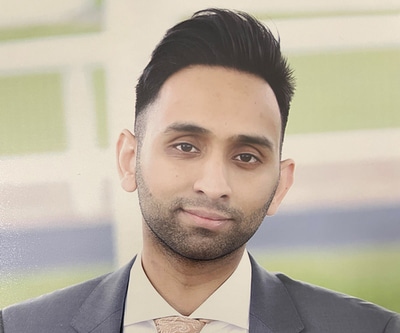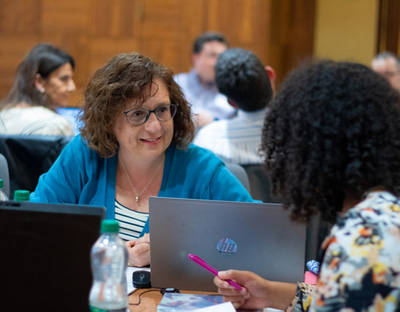- OT
- Professional support
- AOP
- Challenges, changes, successes and the future: thoughts from new AOP Councillors
Challenges, changes, successes and the future: thoughts from new AOP Councillors
OT speaks to four new AOP Councillors about the direction of optometry

25 August 2022
What issue in optometry is most important to you?
“One of the main issues in optometry right now is around recognition – the recognition of the profession as a healthcare provider,” University of Manchester optometry Master’s student and newly-appointed AOP Councillor representing undergraduate student optometrists, Laura Josephs, told OT.
This is exactly the direction that Josephs wishes the profession to go in. “I am all for these developments to the role, but that is also why I think optometry should be recognised fairly,” she said.
Optometrist and new AOP Councillor representing franchisee/joint venture partner optometrists, Adnaan Ahmad, feels that optometry is currently going through a “massive” transition period and there are many issues that need to be discussed that affect the role of the optometrist.
“[As a profession] we have the ability to help ease the pressure on the hospital eye care service and GPs, and although there are some schemes currently in place, I believe we can do a lot more in this area,” he shared, highlighting: “We have heavily adapted during COVID-19 and I believe the learnings from the past two years can transcend optometry into a better way of working in the future.”
In Josephs’ view, the lack of recognition has led to other challenges for the profession. “Some practitioners, rightly so, do not want to play a bigger role in healthcare. This is due to the lack of recognition, but it is also about fair pay too,” she said.
Josephs shared that because of the inadequate NHS fees, she has noticed a number of practices in her local area going private and halting NHS sight testing completely over the last few years. “They are losing too much money,” she said, sharing: “I do worry that it will get to the point where there will only be a select number of practices that people can go to for an NHS sight test.”

She also highlights the time lapse between the stated follow up appointment and when the patient is actually seen and the impact on patient ocular prognosis.
For new south west representative Gennard, it is the recently closed General Optical Council’s call for evidence on the Opticians Act that could lead to some of the biggest challenges over the coming years. “There is huge potential for the way we work to change. It is important that all areas of the profession are consulted and represented on these matters, and that we work together to build a model of optometry that is fit for purpose in the coming years.”
What do you feel the profession’s biggest challenge was during the pandemic and why?
For Ali it was: “Knowing which patients to prioritise based on their clinical needs and urgency of the ocular condition they present with, and knowing which appointments can be deferred.”
He explained that the “domino effect” of the pandemic on cataract progression for patients referred 18 months ago who are now having to wait “an extra year” for surgery can already be seen. The delay has “left them massively with worsening eyesight,” he said.
For Gennard, the biggest challenge was about “keeping ourselves, our staff and our patients safe, particularly in the early days of the pandemic.”
Josephs shared insight into her education experiences and the challenges she faced during the pandemic. “Going into university not even once a week for just an hour for some practicals made it really difficult going into my third year when it came to seeing patients – like many of my peers, I had never done a full sight test on a patient,” she shared.
“Even today, as I finish my third-year exams, I have not done direct ophthalmoscopy on a person because we have been advised not do it anymore due to the proximity needed to the patient. Instead we use Volk.”
What do you feel the profession’s greatest success was during the pandemic and why?
“The development of COVID-19 Urgent Eyecare Services (CUES),” said Josephs without hesitation. “The pathway was created very quickly, with people coming together to establish a service that ensured patients and their eye care was protected.”
Similarly for Ahmad a “huge success” came from the collaboration between different healthcare practitioners – optometrists, GPs and ophthalmologists – as well as different companies.
“Working together and helping each other was an amazing achievement,” he emphasised.
Collaboration and teamwork also top Ali’s list. The pandemic saw “all members of staff working collectively as a team,” she told OT.
“Everyone played an important role in ensuring a good level of service was provided. Lots of staff went above and beyond and this in turn creates a strong workforce,” she highlighted.
Gennard was impressed by how the profession found new ways of working. “The way we implemented and learnt new systems and ways of working is a credit to the profession. It gives us a platform to build on in coming years.”
As a newly elected Councillor, what three changes would you like to see to help the profession move forward?
For Josephs, the top three changes would be: more cohesion between optometry as a community to challenge the Government for fair pay for fees, more conversations with and amongst students, and greater transparency of the changes that will be made to the education requirements.
On the latter she told OT: “It feels like we are being told it is changing, but conversations with students about what changes are being implemented and how they will be affected are not happening. In my experience, when I have found information to read on it, I have ended up Googling every second word as I didn’t know what it meant.”
Ali said she was hoping for improved communication between hospitals and the High Street for better patient care, while for Ahmad shared care schemes to help ease the pressure on secondary, more prescribing powers for all optometrists, and easier access to certain medications “maybe with GP/ophthalmologist signing off,” are important.
Gennard is keen for the public and other healthcare professionals to have an increased awareness of the skills of optometrists and dispensing opticians. She would also like to see the development of a country-wide approach to optometry across England, as well as the expansion, education and remuneration of the enhanced services that optometrists can offer.
The trio of new Councillors share what they will bring to Council
What perspective do you bring to AOP Council?
Josephs: As I am new to the profession, I hope to bring fresh eyes. While I am new to optometry, I previously worked in a healthcare setting for a while, so combining this experience with fresh eyes, I hope to be able to share a new perspective on things.Ali: Coming from a hospital background and now working in both hospital and on the High Street, I find myself in a situation where sometimes I need to swap my thinking cap depending on the environment I am in. Working as a specialist makes me more confident when it comes to deciding whether a patient requires referral or not when encountered on the High Street. Moreover, you are in a better position when educating the patient in what to expect once they attend the eye unit.
Ahmad: I always try and look at the whole visual field (pun intended) and bring a very fair and thoughtful perspective to every situation. Listening to others’ perception can also be extremely valuable as you can’t always see everything.
Gennard: During my years as a practicing community optometrist, I have always aimed to keep patient care at the heart of what I do. I hope I am able to bring my enthusiasm for primary care optometry to the Council. I also have an interest in reducing health inequalities and through my work with Vision Care for Homeless People aim to provide eye care and spectacles to the more vulnerable in our society.
In three words, how would you sum up your feelings about the next 12 months?
Josephs: Positive, excited, determined.
Ali: Opportunism, advancement, solidarity.
Ahmad: Challenging, optimistic, dynamic.
Gennard: Challenging, cooperation, community.


Comments (0)
You must be logged in to join the discussion. Log in